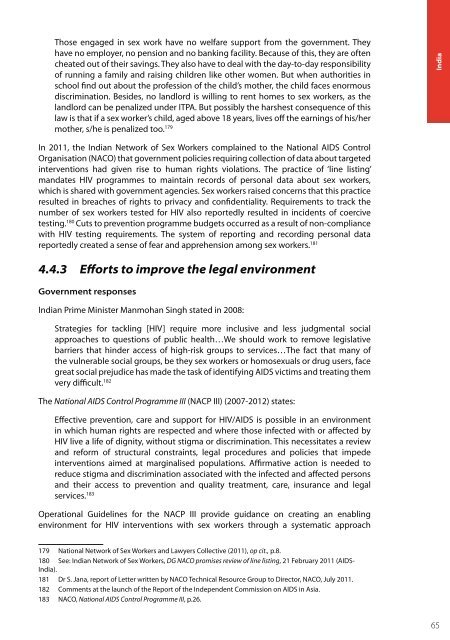SEX WORK AND THE LAW - HIV/AIDS Data Hub
SEX WORK AND THE LAW - HIV/AIDS Data Hub
SEX WORK AND THE LAW - HIV/AIDS Data Hub
Create successful ePaper yourself
Turn your PDF publications into a flip-book with our unique Google optimized e-Paper software.
Those engaged in sex work have no welfare support from the government. They<br />
have no employer, no pension and no banking facility. Because of this, they are often<br />
cheated out of their savings. They also have to deal with the day-to-day responsibility<br />
of running a family and raising children like other women. But when authorities in<br />
school find out about the profession of the child’s mother, the child faces enormous<br />
discrimination. Besides, no landlord is willing to rent homes to sex workers, as the<br />
landlord can be penalized under ITPA. But possibly the harshest consequence of this<br />
law is that if a sex worker’s child, aged above 18 years, lives off the earnings of his/her<br />
mother, s/he is penalized too. 179<br />
India<br />
In 2011, the Indian Network of Sex Workers complained to the National <strong>AIDS</strong> Control<br />
Organisation (NACO) that government policies requiring collection of data about targeted<br />
interventions had given rise to human rights violations. The practice of ‘line listing’<br />
mandates <strong>HIV</strong> programmes to maintain records of personal data about sex workers,<br />
which is shared with government agencies. Sex workers raised concerns that this practice<br />
resulted in breaches of rights to privacy and confidentiality. Requirements to track the<br />
number of sex workers tested for <strong>HIV</strong> also reportedly resulted in incidents of coercive<br />
testing. 180 Cuts to prevention programme budgets occurred as a result of non-compliance<br />
with <strong>HIV</strong> testing requirements. The system of reporting and recording personal data<br />
reportedly created a sense of fear and apprehension among sex workers. 181<br />
4.4.3 Efforts to improve the legal environment<br />
Government responses<br />
Indian Prime Minister Manmohan Singh stated in 2008:<br />
Strategies for tackling [<strong>HIV</strong>] require more inclusive and less judgmental social<br />
approaches to questions of public health…We should work to remove legislative<br />
barriers that hinder access of high-risk groups to services…The fact that many of<br />
the vulnerable social groups, be they sex workers or homosexuals or drug users, face<br />
great social prejudice has made the task of identifying <strong>AIDS</strong> victims and treating them<br />
very difficult. 182<br />
The National <strong>AIDS</strong> Control Programme III (NACP III) (2007-2012) states:<br />
Effective prevention, care and support for <strong>HIV</strong>/<strong>AIDS</strong> is possible in an environment<br />
in which human rights are respected and where those infected with or affected by<br />
<strong>HIV</strong> live a life of dignity, without stigma or discrimination. This necessitates a review<br />
and reform of structural constraints, legal procedures and policies that impede<br />
interventions aimed at marginalised populations. Affirmative action is needed to<br />
reduce stigma and discrimination associated with the infected and affected persons<br />
and their access to prevention and quality treatment, care, insurance and legal<br />
services. 183<br />
Operational Guidelines for the NACP III provide guidance on creating an enabling<br />
environment for <strong>HIV</strong> interventions with sex workers through a systematic approach<br />
179 National Network of Sex Workers and Lawyers Collective (2011), op cit., p.8.<br />
180 See: Indian Network of Sex Workers, DG NACO promises review of line listing, 21 February 2011 (<strong>AIDS</strong>-<br />
India).<br />
181 Dr S. Jana, report of Letter written by NACO Technical Resource Group to Director, NACO, July 2011.<br />
182 Comments at the launch of the Report of the Independent Commission on <strong>AIDS</strong> in Asia.<br />
183 NACO, National <strong>AIDS</strong> Control Programme III, p.26.<br />
65
















